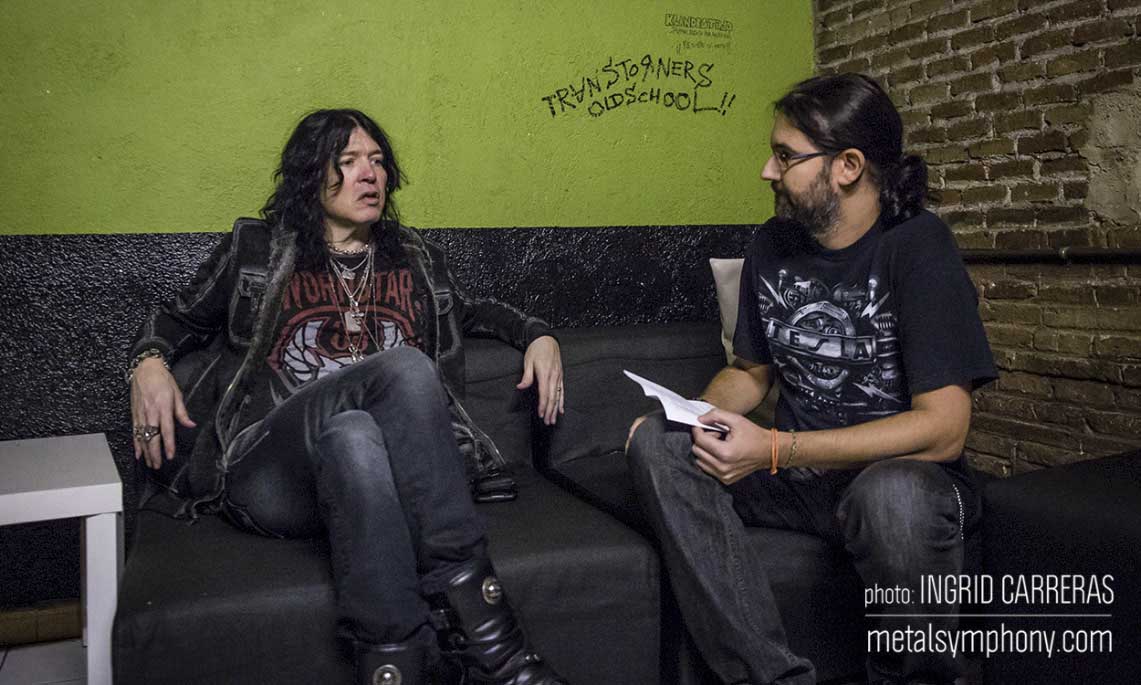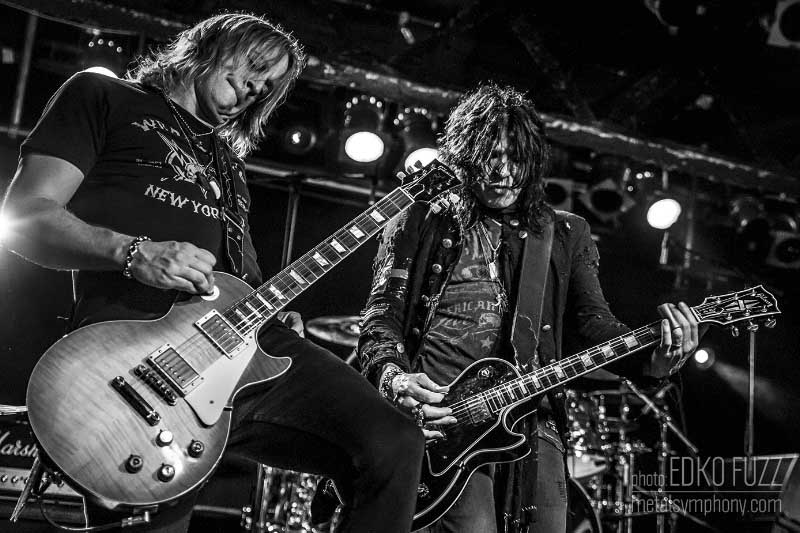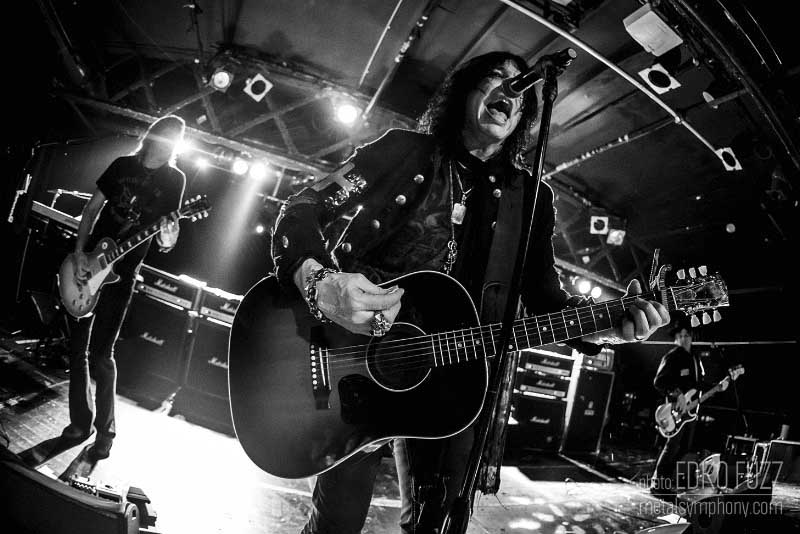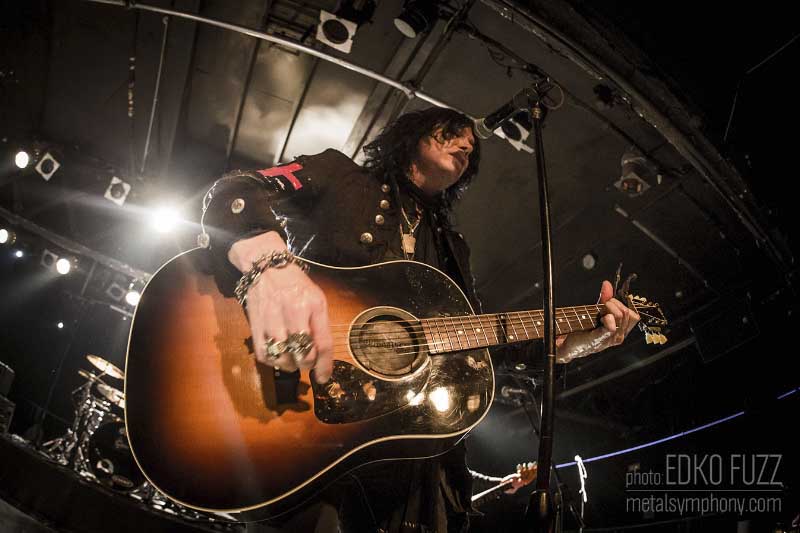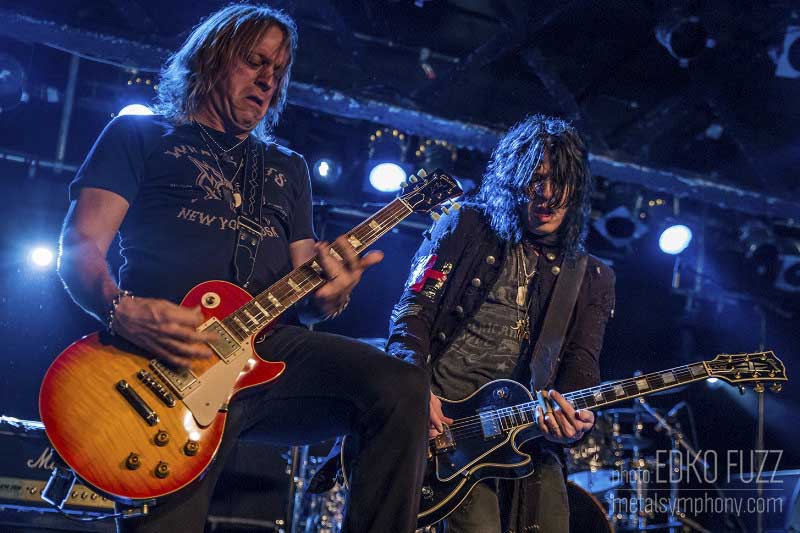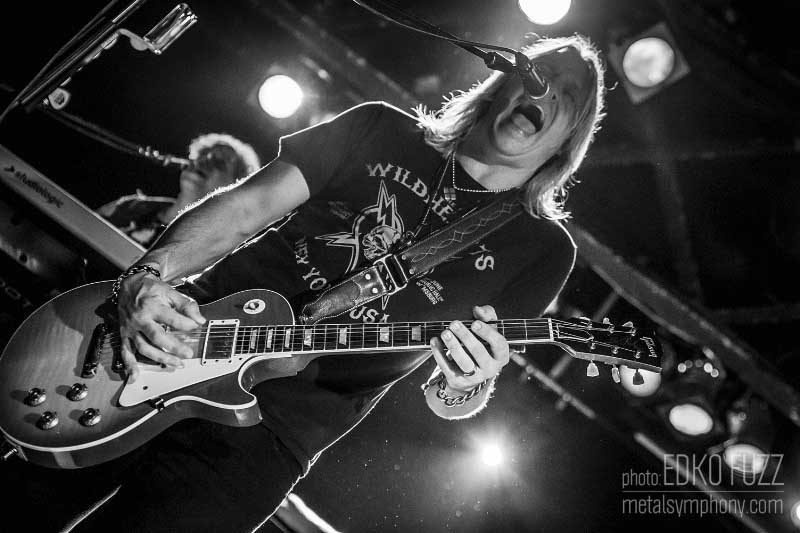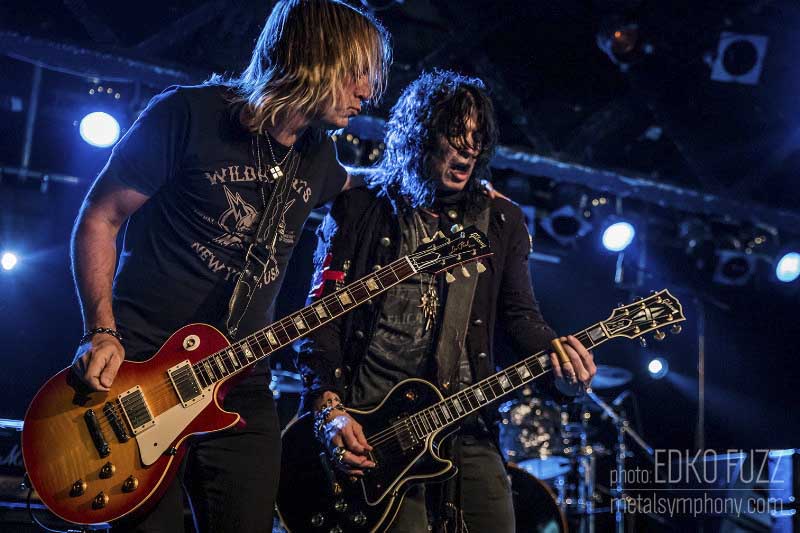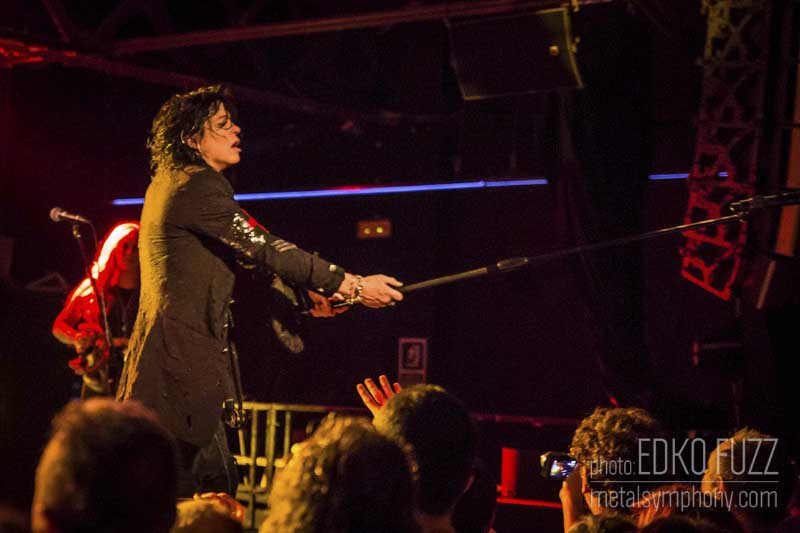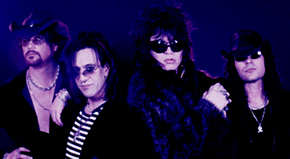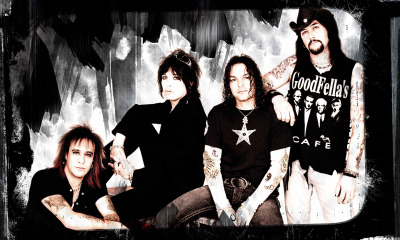Tom Keifer parece estar en un momento dulce de su carrera. Saboreó las mieles del éxito masivo a finales de los ochenta con Cinderella, pero la oleada Grunge también se cobró a la banda de Filadelfia como víctima durante el cambio de tercio que sufrió el mundo del negocio de la música a principios de los noventa. Tras eso, problemas con sus cuerdas vocales y pleitos con discográficas hicieron que pareciera que a Keifer se lo había tragado la tierra. Pero dicen que el tiempo lo cura todo, y una creciente demanda de nostálgicos y nuevos fans hizo que Cinderella se reunieran a mediados de la década pasada para girar con cierto éxito. Tras unos cuantos años girando con la banda, Keifer se decidió, por fin, a editar su primer trabajo en solitario, "The Way Life Goes", un disco largamente gestado en Nashville, la ciudad donde Keifer reside actualmente. El disco generó buenas críticas, y la aceptación entre los fans parece haber sido generalizada, pues el estilo del disco no difiere demasiado a lo que Keifer nos tenía acostumbrados.
Ahora, tras más de dos años y medio presentando el disco con éxito por los escenarios de su América natal, Keifer y su banda cruzaron por fin el charco y se embarcaron en una gira de tres semanas que les llevó por toda Europa, incluyendo una rarísima fecha en la Sala Razzmatazz 2 de Barcelona. Se trataba de la segunda vez que Keifer actuaba en la ciudad, más de cuatro años después de su tardío debut en 2011. Por supuesto, como buenos fans del hard rock con pedigree, Metal Symphony no podíamos perdernos tamaño acontecimiento y conseguimos sentarnos unos minutos con un auténtico icono de la música americana para debatir sobre diversos temas unas horas antes de que la banda tomara el escenario de la ciudad condal.
Edko Fuzz / Ingrid Carreras
Metal Symphony – Hola Tom, es genial tenerte de vuelta en Barcelona.
Tom Keifer – Es genial estar aquí.
MS – ¿Cómo está yendo esta gira?
TK – ¡Muy bien! Hemos estado por aquí poco más de dos semanas. Hemos hecho Bulgaria, Rusia, Alemania, Italia… hemos estado en Estocolmo y hemos tenido buena recepción por parte de toda la gente. Nos lo estamos pasando en grande. Tenemos muchas ganas de tocar aquí esta noche. Recuerdo la última vez que estuvimos por aquí, en 2011 creo. ¡El público fue genial y nos lo pasamos muy bien!
MS – Si no te importa, empezaremos hablando de tu carrera en solitario. Te mudaste a Nashville hace unos años y siempre hablas de la cantidad de buenos músicos que has conocido en esa ciudad. Sin embargo, no hemos visto nada tuyo que haya sido creado en tu etapa de Nashville aparte de tu disco en solitario. ¿Has colaborado con otros artistas o aparecido en discos como músico de sesión?
TK – No he hecho mucha cosa, pero sí que trabajé con el artista country Andy Griggs. De hecho, mi mujer Savannah y yo co-escribimos un tema con él llamado "A Hundred Miles of Bad Road" que estaba en su disco "Freedom". Aparte de eso, también le produje algunos temas. También trabajé con Bo Bice en Nashville cuando vino a hacer su disco para American Idol, y le produje unos cuantos temas. He escrito algunas cosas aquí y allá, pero nada que acabara en discos aparte de los dos que te acabo de comentar.
MS – Has estado ocupado con tu material en solitario…
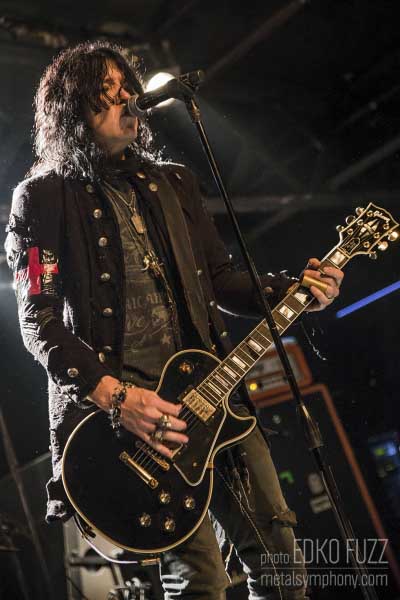 TK – Principalmente he estado ocupado en general. Todo el tiempo que estuve haciendo el disco estaba, además, girando con Cinderella, así que entre ambas cosas y mi familia, que es una gran prioridad para mí, no tengo tiempo para hacer muchas más cosas. Son tres grandes responsabilidades y no me gusta no poder llegar a todo.
TK – Principalmente he estado ocupado en general. Todo el tiempo que estuve haciendo el disco estaba, además, girando con Cinderella, así que entre ambas cosas y mi familia, que es una gran prioridad para mí, no tengo tiempo para hacer muchas más cosas. Son tres grandes responsabilidades y no me gusta no poder llegar a todo.
MS – Hemos oído que tu hijo practica muchos deportes y te tiene ocupado…
TK – Sí, muy ocupado. Le encantan los deportes y tiene unos horarios bastante completos en lo que a deporte se refiere. Y cuesta trabajo adaptarse a eso.
MS – También hemos oído que algunas de las canciones de "The Way Life Goes" vienen de unas sesiones que Cinderella tuvisteis para un disco que nunca llegó a existir…
TK – Sí. En 1998 o 1999 firmamos un contrato con Sony Records, pero el disco nunca salió. De hecho ni siquiera se grabó porque acabamos en un pleito y el contrato se fue al garete y entonces la cosa se puso fea. No fueron momentos divertidos, así que algunas de las canciones que escribí para ese disco las usé en mi disco en solitario, porque durante el pleito no se nos permitió grabar juntos a los miembros de Cinderella. Ahí es donde empecé a trabajar en mi disco así que, en efecto, algunas de las canciones vienen de ese periodo.
MS – ¿Hay además canciones grabadas que no hayan aparecido en el disco? Y en caso de que existan, ¿hay planes para ellas?
TK – Pues sí, la verdad es que las hay. Hemos estado girando con este disco más de dos años con la banda, y de hecho vamos a seguir haciéndolo el próximo año. Sin embargo, hay planes para editar una edición limitada de "The Way Life Goes" el año que viene, que constará del disco remasterizado y algunos bonus tracks. Pero lo que de verdad importa es que acabaré grabando una continuación de "The Way Life Goes", así que algunas de esas canciones que mencionas podrían acabar en el nuevo álbum aunque también estoy escribiendo material nuevo.
MS – Has estado tocando con Eric Brittingham desde que erais chavales. Empezasteis con Saints in Hell y luego en una banda de versiones llamada Priscilla Harriet Band. ¿Cómo te sientes al girarte a la izquierda en el escenario y no verle a él?
TK – Bueno, Cinderella tuvieron su momento y Eric y yo hemos tocado juntos durante mucho tiempo. A veces un nuevo proyecto necesita savia nueva, y cuando ésta llega y entra en tu vida, se convierte en tu nueva familia. Hemos estado tocando durante casi dos años y medio. Lo más extraño para mí fue cuando junté a la banda y tocamos nuestro primer show. Habíamos estado ensayando durante un mes y todo sonaba genial, pero luego me subí al escenario esa primera noche y durante el primer tercio del show pensé ‘¡Esto es muy extraño!’ No puedo describirlo realmente, pero a la que llevábamos la mitad del show ya estábamos conjuntados. Es una sensación distinta, simplemente es distinto y no hay otra forma de describirlo que esto es lo que siento ahora y me encanta la banda que me acompaña.
MS – Hablemos un poco de Cinderella. Tus fans siempre se preguntan por qué casi nunca tocáis material de "Still Climbing" en directo, y nos preguntábamos si es así porque a lo mejor está ligado a una etapa de tu vida que no fue muy feliz y prefieres no recordarla…
TK – No, no es eso. Tocamos material de ese disco en la gira de presentación en 1994, y en otras giras sí tocábamos el tema título. Cuando confeccionas el setlist tiendes a incluir las canciones más populares porque al final eso es lo que la mayoría de la gente del público quiere escuchar. Hay ciertos temas que tienen que estar en el set como "Nobody’s Fool", "Don’t Know What You Got (‘Til It’s Gone)", "Shelter Me", "Shake Me", "Somebody Save Me", "Coming Home", "Gypsy Road"… Hay mucho material que tenemos que hacer, porque si dejas "Nobody’s Fool" fuera vas a tener mucha más gente cabreada que los que quieren escuchar "Still Climbing", así que tienes que encontrar ese equilibrio. En el show suele haber espacio para intercambiar un par de temas, pero muchas veces acabamos escogiendo temas de discos más populares como "Night Songs", que siempre ha gustado en directo aunque nunca fue single, o "Fallin’ Apart at the Seams". Siempre intentas hacer feliz a cuanta más gente mejor. No es fácil conseguirlo, pero para dejarlo claro, hemos hecho canciones de ese disco a veces pero obviamente no tanto como de los otros discos porque "Still Climbing" no vendió y no es tan conocido, digamos. Probablemente esa es la razón principal, pero me encanta el disco. Es bueno.
MS – Volviendo a los ochenta, ¿se planteó Cinderella alguna vez la posibilidad de mudarse a Los Angeles, ya que era el epicentro de todo el movimiento hard rock? En caso de no ser así, ¿cómo vivisteis todo aquel movimiento, en el que se os incluyó, desde la distancia?
TK – No, nunca nos planteamos ir a otra ciudad. Creo que puedes hacer música donde quiera que estés. Siempre optamos por la vía de tener a alguien que nos representara: un manager, un abogado y luego llevar todo eso a las compañías de discos. Puedes hacerlo desde cualquier sitio y ése era nuestro hogar. Ahí es donde crecimos así que simplemente nos quedamos en Filadelfia. No creo que tengas que marcharte de donde eres ya que puedes desarrollar tu música o tu arte sea cual sea tu procedencia y luego dejarlo en las manos correctas.
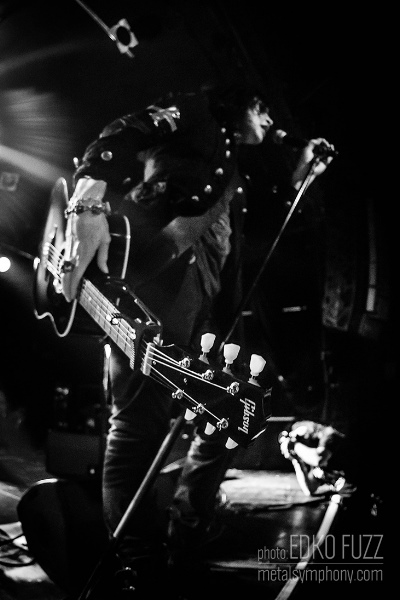
MS – Todo el mundo conoce la historia de cómo Jon Bon Jovi os vio en directo y presionó a la discográfica para que os firmara…
TK – ¡Y si nos hubiéramos mudado a Los Angeles quizá no nos hubiera visto!
MS – ¡Exacto! Sin embargo también hemos leído que antes que él, Gene Simmons de KISS os vio u os escuchó e intentó ayudaros. ¿Es eso cierto?
TK – Pues sí. Eso fue un par de años antes de que Jon nos viera en directo. Le mandamos una demo a Gene porque habíamos oído que había ayudado a Van Halen a lograr su contrato. Éramos jóvenes, estábamos muy verdes y no sabíamos lo que hacíamos. Ya sabes, ¡el cielo es el límite! (Se ríe). En cierto modo tiene sus ventajas. Entonces pensamos "Bueno, si ayudó a Van Halen, quizá también nos ayude a nosotros." Así que le mandamos la cinta y nos llamó rápidamente y nos dijo que le encantaba el material. Nos llevó a su casa en Nueva York, habló con nosotros y dijo que estaba interesado en ayudarnos y empezó a mover la cinta. Por la razón que fuera, no consiguió que ningún sello se interesara, pero él fue realmente el primero en mostrar un interés por Cinderella y, por supuesto, le estamos muy agradecidos por ello. De hecho últimamente he estado contando esta historia más veces porque la historia con Jon siempre suscita más interés porque acaba con nosotros firmando con un sello, pero la de Gene, no. Jon siempre ha salido durante años en nuestras entrevistas y hemos hablado de ello porque es lo que nos preguntaban. Siempre hablábamos de Jon, a quien también estoy muy agradecido por todo lo que hizo. Sin embargo, en medio de todo eso la historia de Gene Simmons no ha sido contada y eso me lo comentaron unos fans en Twitter hará un año y medio. Dijeron que debería empezar a contar la historia del interés de Gene porque es genial que también él intentara ayudarnos.
MS – ¡La pregunta obligatoria aquí es si Gene trató de reclamar royalties años después cuando vendisteis unos cuantos discos!
TK – (Se ríe) ¡No, no lo hizo!
MS – Me gustaría hablar contigo ahora, de fan a fan, de The Rolling Stones. Sé que tú también eres un gran fan…
TK – Absolutamente.
MS – Me gustaría saber cuál es tu etapa favorita de la banda, o si nos puedes decir tus tres discos favoritos…
TK – Me encanta "Exile on Main St." y me encanta "It’s Only Rock ‘N’ Roll". A ver, amo todos sus discos y aún hacen grandes discos, pero esa etapa de principios de los setenta es la que más me gusta porque son los años en los que crecí. Me acuerdo de "Some Girls" o "The Girl with Faraway Eyes" (Se refiere a "Faraway Eyes" NdR), "Beast of Burden"… Aún hay un sitio en mi corazón para esa época porque iba al instituto y estaba creciendo y aprendiendo a tocar la guitarra y a hacer música. Fueron una gran influencia para mí, pero también creo que siguen grabando grandes discos. "A Bigger Bang" era increíble, "Voodoo Lounge" era sensacional. Son unos escritores muy prolíficos, sus letras y melodías siempre son buenas, nunca pasan de moda.
MS – Has escuchado el nuevo disco de Keith Richards?
TK – Pues no, pero me han dicho que es muy bueno. De hecho, nuestro bajista, Billy, hablaba sobre él el otro día.
MS – El tipo hace lo que le da la gana en el estudio.
TK – Exacto, eso es lo que dijo Billy. Que el disco es un poco desmadrado pero mola mucho.
MS – Sí, si lo hace Keith Richards, mola.
TK – Quiero ver "Under the Influence". ¿La has visto? Es su película.
MS – No.
TK – Billy ha estado dando la vara con lo buena que es.
MS – Pues habrá que verla. El libro de Keith, "Life", también era muy bueno.
TK – Sí.
MS – Bueno, mejor seguimos. Muchas cosas han cambiado en la industria musical desde que editasteis "Still Climbing" y hasta que has vuelto a la acción con "The Way Life Goes". ¿Cómo has vivido esos cambios desde la banda y cómo los has afrontado cuando has tenido que editar, promocionar o girar tu propio disco?
TK – Bueno, no puedes hacer nada al respecto. Por suerte, cuando Cinderella sacamos nuestros discos no había internet, no había streaming y no había gente que tomaba la música sin pagarla. Eso ha creado un problema real en la industria, en que el dinero ingresado ha bajado mucho respecto a lo que solía ser y, para mí, lo más triste de ello es que afecta a los presupuestos de grabación y desarrollo para los nuevos artistas. Cuando empezamos no nos tuvimos que preocupar por eso, pues estábamos bien promocionados y financiados. Teníamos una compañía que estaba con nosotros durante tres o cuatro discos y se aseguraban de que tuviéramos a los mejores ingenieros, productores y estudios y nos ayudaron a crecer como banda, pero lo podían hacer porque había el dinero para ello. Eso se acabó. Las compañías están perdiendo tanto dinero de la venta de música que es complicado.
Así que para responder realmente a tu pregunta, cuando edité "The Way Life Goes" obviamente sentí el impacto de todo eso porque las ventas ya no son… Mira, con lo que ha sonado "Solid Ground" en la radio americana, en los ochenta probablemente hubiéramos sido disco de platino, pero ello no se ha reflejado ahora en las ventas. Lo más interesante de todo esto es que giramos por América y ahora estamos aquí en Europa, y todo el mundo canta las nuevas canciones y da la sensación que hay mucha más gente que tiene el disco que lo que en realidad muestran los números de ventas así que… ¡SÍ! Es cierto que está sucediendo. (Se ríe). La gente está "tomando prestada" la música, ¿verdad? Son nuevos tiempos y no hay nada que puedas hacer al respecto. Mi actitud es que me encanta hacer música así que voy a seguir haciéndolo. Solo tengo gratitud para los increíbles fans que estuvieron ahí para Cinderella en los ochenta y noventa y que aún siguen aquí. Aún vienen a los conciertos y cantan todo el material de Cinderella y ahora, además, cantan mi material en solitario. Pero ya sabes, el tema con los discos… no se venden pero todo el mundo los tiene.
MS – Mencionas lo difícil que es para las nuevas bandas desarrollarse y crecer. Cuando vosotros crecisteis teníais influencias como Led Zeppelin, los Stones o The Beatles. ¿Crees que ahora mismo hay bandas que pudieran ser buenas influencias para las bandas que comienzan como las citadas bandas lo fueron para vosotros?
TK – Sí, me encantan Halestorm. Creo que Halestorm son una de las mejores bandas de rock que hay ahora mismo, probablemente mi banda favorita de rock. Su nuevo disco es increíble y el crecimiento de la banda disco a disco viene siendo difícil de creer. Hace un par de años les conocí e hicimos algunos shows juntos y son muy buena gente. La voz de Lzzy es de otro mundo, la banda es buenísima, los amo. Recomendaría a quien sea que los escuchara. En el mundo del rock, para mí, ellos son la banda.
MS – Se ha dicho muchas veces que el Grunge mató al Hard Rock en los noventa…
TK – ¿Yo he dicho eso? (sonríe)
MS – No, no. Simplemente "se dice".
TK – ¡OK! (se ríe)
MS – Queríamos saber tu opinión al respecto, y la pregunta de oro: ¿hay alguna banda del movimiento Grunge que te guste y que recomendarías?
TK – Claro. No creo que el Grunge matara al rock de los ochenta, sino que fue la propia industria quien lo hizo. Un día la industria se levantó y decidió que esto era lo que se llevaba y que ya no había sitio para esos otros tipos. Es, literalmente, lo que pasó. Las bandas de Seattle y el Grunge estaban explotando y tenían muchos fans y vendían montones de discos, pero seguía habiendo gente interesada por las bandas de los ochenta. Sin embargo, la industria, los sellos, la prensa simplemente decidieron que eso ya no molaba porque había un nuevo movimiento. Pensaron "a la mierda con ellos" y despidieron a bandas que habían vendido millones de discos y habían generado todo tipo de ventas y dinero para ellos, y sin embargo dijeron "se acabó". No es la música Grunge quien lo hizo, sino la industria. Fue el giro de 180 grados más radical que ha habido jamás en la industria musical. De repente, si eras una banda de los ochenta no se te permitía tener un contrato discográfico, no se te permitía aparecer en la MTV, literalmente. Es así como lo percibimos y hay mucho de verdad en ello, fue así de sistemático.
La música, por otra parte, me parecía genial. Me encanta Nirvana, amo a Soundgarden. Para mí fue más un cambio de moda que musical, porque cuando escucho a Soundgarden o Nirvana me sigue sonando a rock and roll: las letras y melodías son un poco más oscuras, pero eran guitarras a toda pastilla, voces gritonas y baterías retumbando. No era tan distinto de lo que hacíamos nosotros, pero el look de las bandas era muy distinto. Toda esta decisión de "adiós a lo viejo y hola a lo nuevo" estuvo más basada en una declaración de intenciones referente a la moda donde nosotros éramos muy glam y llamativos. De hecho, todos los ochenta lo fueron, no solo el rock. Incluso el pop con Madonna, Boy George, Cindy Lauper… Todo en los ochenta lo era. Así que fue como una rebelión visual que optaba por camisas de franela y botas Doc Martens mientras se miraban a los pies y actuaban como si no les importara nada. Para mí eso era más una declaración de principios que un cambio musical. Me hace gracia que luego esa imagen acabó siendo tanta o más pose que lo que hacíamos nosotros en los ochenta, ahí está la ironía de todo esto.
Creo que hay muchos momentos en que la industria de la música es culpable de escuchar la música con los ojos y no los oídos. Creo que la industria musical sería un sitio mejor si la gente escuchara la música con sus oídos. En los ochenta había muchas bandas creíbles y auténticas musicalmente, y había otras que no lo eran. Eso ha sucedido en cada década, pero todo lo de los ochenta de repente fue repudiado y se convirtió en ilegítimo durante mucho tiempo. Pero no fue por lo que esos tipos de Seattle estaban haciendo, sino que fue más cosa de la industria. Es lo que creo.
MS – Muy bien. Bueno Tom, tendremos que dejarlo aquí.
TK – OK, de acuerdo. ¡Gracias!
MS – Muchas gracias a ti por ser tan amable con nosotros.
Edko Fuzz / Ingrid Carreras
| ENGLISH VERSION |
MS- Hi Tom, it’s good to have you back in Barcelona.
TK- It’s good to be here.
MS- How is the tour going?
TK- Really good! We’ve been here a little over two weeks. We’ve done Bulgaria and Russia, Germany, we’ve been to Italy, Stockholm and all the crowds have been been great, we’ve been having a great time. Looking forward to playing here tonight. I remember the last time we played here, it was 2011, I think. Really great crowd, really fun.
MS- If you don’t mind, first we would like to start with some questions about your solo career. You moved to Nashville a few years back and you always talk about meeting great musicians in Nashville and playing with them but in the end we have only seen that your body of work from Nashville is your solo record. We were wondering if you have made collaborations with some other musicians, appearing in records as a session musician or something like that.
TK- I haven’t done a lot but I did some work with Andy Griggs who’s a country artist there. I wrote a song, actually my wife Savannah and I co-wrote a song with him called “A Hundred Miles of Bad Road” which was on his record “Freedom” and I also produced some tracks for him. I also worked with Bo Bice in Nashville when he came there to do his record for American Idol and I produced some tracks for him. I’ve done a little bit of writing here and there and nothing’s ended up on records other than the two that come to mind that I’ve been involved with.
MS- You have been keeping busy apart from your solo stuff.
TK- Mainly I’ve been busy, the whole time I was making the solo record I was doing that and I was still touring with Cinderella, so between touring with Cinderella, working on the solo record and my family which is a huge priority to me I don’t have a lot of time to do much else. That’s three pretty big responsibilities, I don’t like to spread myself too thin.
MS- I’ve heard that your son practices several sports and keeps you busy.
TK- Yes, very busy, he loves sports, he has a pretty hectic sports schedule that work comes keeping up with.
MS- We’ve also heard you mentioned that some of the songs in “The Way Life Goes” come from some writing sessions that Cinderella had for a record that never came to be.
TK- Yes, we had signed a deal in 1998 or 1999 with Sony Records. The record was never released, it was never made actually because we ended up on a lawsuit and the deal went south and it got real ugly, not a fun period of time. So some of the songs that I wrote for that I recorded for my solo record because during the lawsuit we were restricted from recording with each other, so that’s when I started to work on my solo record and I used some of the songs that I had written for that record. A handful of the songs from this record were songs from that period, yes.
MS- And are there also some songs that you recorded that are not on the record? And if they exist, are there plans for those songs?
TK- Yeah, there definitely are. My next step would be continuing to tour with this band, which we’ve been touring non-stop for over two years, we’re gonna tour next year too behind “The Way Life Goes”. Actually we’re gonna release probably a limited edition version of “The Way Life Goes” next year, remastered with some bonus tracks and stuff on it but the bigger picture is I will eventually record a follow-up to “The Way Life Goes”. So some of those songs that you mentioned could end up on it but I’m writing some new stuff, too.
MS- You have been playing with Eric Brittingham since you were kids in a band called Saints in Hell, you also played in a cover band called Priscilla Harriet Band. We wonder how do you feel when you’re on stage and you turn left and you don’t see him there?
TK- Well, Cinderella had its time, Eric and I played together for a long time. Sometimes a new project needs new blood so when that new blood comes in you know it becomes your new family. We’ve been playing together for like I said two and a half years. The strangest part for me was when I put the new band together, the very first show that I played live with this band it felt strange to me. We had rehearsed for a month and everything sounded great and then when I walked out on stage that first night for about the first third of the show it was like, "This feels really different!", I can’t really describe it but it only took about halfway through the show, we just kind of gelled. It’s just a different feeling, it’s just something different, there’s no way to describe it other than this is what I’m feeling now, and it’s what I’m doing now and I love this band that I’m now with.
MS- We would like to focus on Cinderella now. Your fans always wonder how is it that you almost never play stuff from “Still Climbing” live and we were wondering if maybe it is because it is tied to a not so happy period of your life and you don’t want to remember it or is it something else?
TK- No, it’s not so much that. We have played stuff on the tour for that record, we played a lot of stuff from 1994 and then there were other tours that we did the title track “Still Climbing”. When you put together a setlist you kind of look at what are the most popular tracks because at the end of the day that’s what the majority of the people in the audience wanna hear, so most of those are the singles that were released. There’s an amount of the songs that have to be on the set like “Nobody’s Fool”, “Don’t Know What You’ve Got (‘Til It’s Gone)”, “Shelter Me”, “Shake Me”, ”Somebody Save Me”, “Coming Home”, “Gypsy Road”… I mean there’s a lot that have to be there because if you leave “Nobody’s Fool” out you’re gonna have a lot more people angry than someone who wants to hear “Still Climbing”, so you kind of got to strike that balance. There’s usually room in the show to interchange some album tracks and a lot of times we end up kind of going with the more popular album tracks, like “Night Songs”, it’s always been a very popular live song even though it wasn’t a single, and “Fallin’ Apart at the Seams” is. You try to strike that balance where you’re making as many people happy as you can. It’s a hard balance to strike but just to clear up, we have done songs from that record live, but not obviously as much as we have from the other records because that record did not sell and wasn’t as well known shall we say. It was probably the crux of the matter, the main reason, but I love the record, it’s a cool one.
MS- Going back to the late 80s, did Cinderella ever consider the option to move to LA since that was the epicenter of the hard rock at the time, and if not, how did you leave all the movement that you were pinpointed in from the distance?
TK- We never thought about moving to a different city. I think you can make music anywhere you are. We just always took the approach to get someone to represent us, a manager, a lawyer, and take it to record companies. You can do that from anywhere you are, that was our home, that’s where we grew up, we just stayed in Philadelphia. I don’t believe that you have to leave where you are, you can develop your music, your art from wherever you are and just try to get it into the right hands.
MS- Everybody knows that Jon Bon Jovi saw you live and kind of pushed the people at the record company to sign you.
TK- And if we’d moved to LA he may had never seen us!

MS- Exactly. But we also read that before Jon Bon Jovi, Gene Simmons of KISS saw you or heard you and tried to help you. Is that true?
TK- Yeah, that was a couple of years before Jon saw us. Actually and we sent him a demo tape because we’d heard he’d helped Van Halen to get his deal. We were just young, green, we didn’t know what we were doing… The sky’s the limit, right? There’s an advantage to that and we thought, "well if he helped Van Halen maybe he’ll help us", so we sent him a tape and he called right back and he said he loved the stuff and he had us up to his place in New York, talked to us and said he was interested in trying to help us and he took it around. For one reason or another he couldn’t get a label interested but he was the first person that really showed an interest in the band and of course we’re very grateful for that. I’ve actually been telling that story more and more lately because the story about Jon always gets told because his interest ultimately led to a record deal and Gene’s didn’t. Jon’s always gets brought up in the press so for years we’ve always followed the questions of the press and talked about Jon. Jon… Jon which I’m very grateful for what he did, too but in the midst of that the story of Gene Simmons has not been told so I had that pointed at to me by some fans on Twitter about a year and a half ago. They said I should start telling about his interest too cause it’s very cool too that he also tried to help us.
MS- The question here is did he claim any royalties when you sold a couple or records years later? (joking)
GS- No, he didn’t. (laughs)
MS- This one is from fan to fan. I know you are a big fan of The Rolling Stones.
TK- Yeah, absolutely.
MS- I’d like to know if you have any favorite eras, which are your 3 favorite albums?
TK- I love “Exile on Main St”, and I love “It’s only Rock ‘n Roll”, I mean I love them all, they still make great records, but that kind of early 70s, early to mid 70s stuff I really love cause that’s when I was growing up. I remember “Some Girls” and “The Girl with Far Away Eyes”, “Beast of Burden”, there’s still a place in my heart for that era because I was in high school and I was growing up then and learning how to play guitar and play music and they were just a huge influence on me. But I think they still make great records to this day, “A Bigger Bang” was amazing, “Voodoo Lounge” was amazing, they’re very prolific writers, their lyrics and melodies are always great, it never feels old.
MS- Have you heard the new Keith Richards’ album?
TK- I have not but I’ve heard it’s really cool. Actually Billy, our bass player was talking about it the other day.
 MS- He’s doing whatever he wants in the studio.
MS- He’s doing whatever he wants in the studio.
TK- Yes, that’s what he said, he’s kind all over the place but it’s all really cool.
MS- Yes, but it’s so Keith Richards that it’s cool.
TK- I wanna watch “Under the Influence” too. Have you seen that? His movie?
MS- No.
TK- Billy has been raving about it and said it’s amazing.
MS- The book is good also, the “Life” book.
TK- Yes.
MS- OK, let’s move on a little bit. A lot of things happened in the music industry since you released “Still Climbing” and until you came back to action with “The Way Life Goes”. How did you live those changes from the sidelines and how did you deal with them when you were back to action to record the album, to promote it, to tour it?
TK- Well, there’s nothing you can do about it. Fortunately the early records that I was involved with when Cinderella came were released during a time when there wasn’t really an internet, there wasn’t streaming, there wasn’t people taking music and not paying for it. That’s created a real problem in the industry because what it does is the income or money that the record companies take in is just so much less than it used to be, and to me the saddest part of that is it affects recording budgets and artists’ development for new artists. We didn’t have to worry about that coming up, we were well promoted and well funded, we had a record company that stayed with us three or four studio albums and made sure we had the best engineers, best producers and the best studios and helped to develop us but they could do that because they had the money to do that. Not so much anymore, the publishing companies and the record companies are losing so much money on the sale of music that it’s challenging.
So to get really to your question, when I released “The Way Life Goes” obviously we felt the impact of that because the sales aren’t what, you know… The amount of airplay we had in the States on “Solid Ground” when the record was released, we probably would have had a platinum record back in the 80s, sales not so much so. But what’s interesting is we tour all around the states and now we’re over here in Europe and everybody’s singing all the new songs and it feels like a lot more people have the record than what we actually show sales for, so it’s like YES!! It really is true (laughs). People are "just borrowing the music", right? It’s a new time, there’s nothing you can really do about it. My attitude is I love to make music so I’m gonna keep making music. I have a lot of gratitude for the incredible fans that came around for Cinderella in the 80s and the early 90s and that are still here today, they still show up, they sing all the Cinderella stuff, and now they’re singing my solo stuff but you know the deal with records, they don’t sell but everyone has them.
MS- You talk about how difficult it is for new bands to develop and everything. When you grew up you had influences of Led Zeppelin, the Rolling Stones, the Beatles… Do you think that there are any bands right now that could be a good influence for bands starting?
TK- Yeah, I love Halestorm. I think Halestorm is one of the best rock bands out there, probably my favorite rock band. Their new record is amazing, the growth of that band from record to record has been incredible. A couple of years ago I met them and we did some shows together and they’re really great people and Lzzy’s voice is insane, the band is great, I love them. I would recommend anybody to check them out. In the rock world they’re the band to me.
MS- It’s been said many times that Grunge killed Hard Rock in the early 90s.
TK- I said that? (he smiles).
MS- No, no, "it’s been said".
TK- Ok (he laughs)
MS- We wanted to ask you what you think about that and the golden question, are there any grunge bands that you like or that would reccommend?
TK- Yeah, I don’t think Grunge killed the 80s rock, I think the industry killed it. The industry one day woke up and decided this is the new cool stuff and we don’t have any room for these guys anymore, that’s literally what happened. I mean the bands from the Seattle and grunge movement were really blowing up and had lots of fans and were selling lots of records, but there were still lots of fans who were interested in the bands from the 80s, too and the record companies when this new movement came along, the radio, the press, the whole industry just decided "this music is not cool anymore, the hell with them" and they dropped bands that had sold millions of records and generated all kinds of sales and money for them and just said that’s it. It’s not the grunge music that did it, it was the industry, it was biggest turn on a dime or 180-degree in the industry ever. All of a sudden if you were a band from the 80s you weren’t allowed to have a record deal anymore, you weren’t allowed to be on MTV anymore, literally it felt like that and there’s a lot of truth to that it was almost that systematic.
The music I thought was great, I love Nirvana, I love Soundgarden. To me it was more a fashion change than music, because when I listen to Soundgarden and Nirvana it just sounds like rock and roll to me. The lyrics and the melodies are a little bit darker, but it was loud guitars and screaming vocals, pounding drums… It wasn’t a whole lot different from what we were doing, but the look was very different. This whole decision of out with the old and on with the new was really based more on a fashion statement where we were very glam and flamboyant, all the 80s were, not just rock, even pop: Madonna, Boy George, Cindy Lauper… The whole 80s. So it was this visual rebellion that came along were it was like now we were flannel shirts and Doc Martens and we stared at our feet and we act like we don’t care so that was a statement more than a musical change in my mind. It’s funny because that look became as big of a pose if not bigger of a pose than what we were doing in the 80s, that’s the irony of it.
I think that there are a lot of times in the music industry that are very guilty of listening to music with their eyes and not their ears. I think the music industry would be a better place if people listened to music with their ears. There were very credible and legit bands musically in the 80s and there were some that weren’t. That’s every decade but the 80s it all got dismissed, they became illegitimate for a long time, it wasn’t because of what those guys in Seattle were doing it was more of an industry thing I believe.
MS-Ok, well that’s it, we’ll wrap it up here.
TK- Ok, cool, alright. Thanks!
MS- Many thanks for being so kind!
Edko Fuzz / Ingrid Carreras

